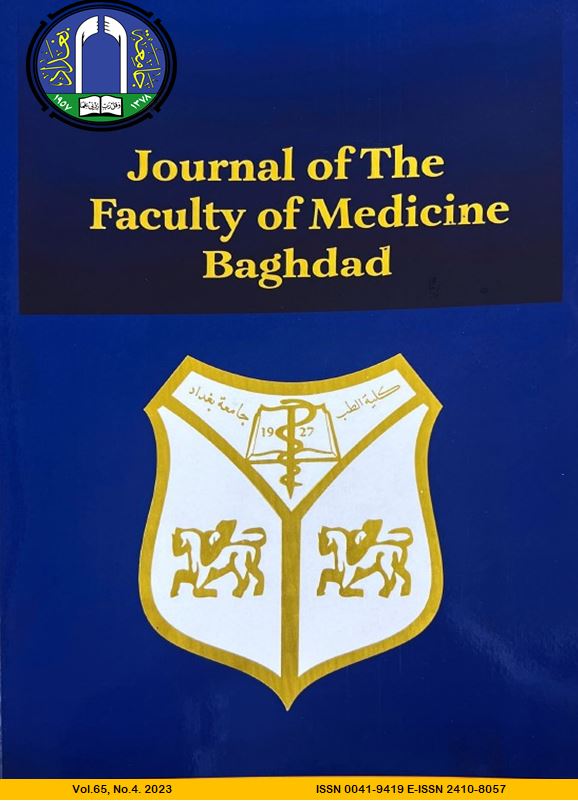Prevalence of Anxiety and Depression Symptoms among Post Bariatric Surgery Patients in Baghdad-Iraq
DOI:
https://doi.org/10.32007/jfacmedbagdad.2129Keywords:
Anxiety, Bariatric Surgery, Body Mass Index, Depression, ObesityAbstract
Background: Obesity is a major public health concern and is on the rise worldwide. Numerous studies revealed that the best method for treating morbid obesity is bariatric surgery, which has indicated its effectiveness in controlling weight. Published studies reported that patients who had undergone bariatric surgery may have psychiatric illnesses when compared to other obese individuals with similar preoperative characteristics.
Objectives: Estimate the rates of anxiety and depression among post-operative bariatric surgery patients.
Methods: A cross-sectional study on 61 patients was conducted at the bariatric clinic in the Gastroenterology and Hepatology Baghdad Teaching Hospital and the Private Nursing Home Hospital in Medical City, Baghdad, Iraq, from the 1st of April to the 30th of December 2021. Generalised Anxiety Assessment–7 (GAD-7) Scale and Patient Health Questionnaire–9 (PHQ-9) scale were applied to assess these conditions.
Results: The prevalence of depression among the studied patients was 32.8%, while the prevalence of anxiety was 44.3%. Marital status, diabetes mellitus, post-operative BMI, and past psychiatric history were significantly associated with depression. Chronic diseases (diabetes mellitus and hypertension), post-operative BMI, and psychiatric history were significantly associated with anxiety.
Conclusions: Anxiety was found to be more common than depression among patients who underwent bariatric surgery. Variables predicting both depression and anxiety were diabetes mellitus, post-operative severe obesity, and a history of psychiatric disorders before surgery.
Received May. 2023
Revised: Jun. 2023
Accepted: July 2023
Downloads
References
World Health Organization. Obesity and overweight. Key facts. Updated 9 June 2021. http://www.who.int/mediacentre/factsheets/fs311/en/ [Accessed 20 Feb 2022] .
World Health Organization [homepage in internet]. Childhood overweight and obesity. [Accessed 20 Feb 2022]. http://www.who.int/dietphysicalactivity/childhood/en/
Sjöström L. Bariatric surgery and reduction in morbidity and mortality: experiences from the SOS study. Int J Obes (Lond). 2008;32 Suppl 7:S93-7.
https://doi.org/10.1038/ijo.2008.244
Alsubaie S, Asiri G, Asiri E, Alqahtani F, Bredy G, Alshehri D. Depression and Anxiety on Post-Bariatric Surgery Among Saudi Adults Residing in Abha, Asir Province, Saudi Arabia. IJMDC 2021; 5(1): 165-171. https://doi.org/10.24911/IJMDC.51-1605799192
Harrison P, Cowen P, Burns T, Fazel M. Shorter Oxford textbook of psychiatry, Seventh Edition. Oxford university press, 2018
https://doi.org/10.1093/med/9780198747437.001.0001
Tindle HA, Omalu B, Courcoulas A, Marcus M, Hammers J, Kuller LH. Risk of suicide after long-term follow-up from bariatric surgery. Am J Med. 2010;123(11):1036-1042.
https://doi.org/10.1016/j.amjmed.2010.06.016
Peterhansel C, Petroff D, Klinitzke G, Kersting A, Wagner B. Risk of completed suicide after bariatric surgery: a systematic review. Obes Rev 2013; 14:369-382. https://doi.org/10.1111/obr.12014
Kroenke K, Spitzer RL, Williams JB. The PHQ-9: validity of a brief depression severity measure. J Gen Intern Med. 2001;16(9):606-13.
https://doi.org/10.1046/j.1525-497.2001.016009606.x
Locke AB, Kirst N, Shultz CG. Diagnosis and management of generalized anxiety disorder and panic disorder in adults. Am Fam Physician. 2015;91(9):617-24.
Sait S, Trabulsi N, Zagzoog M, Mortada H, Altowaireb A, Hemdi A, et al. Prevalence of depression and anxiety disorders among bariatric surgery patients. J Surg Med. 2019;3(8)
https://doi.org/10.28982/josam.604856
Alley JB, Fenton SJ, Harnisch MC, Tapper DN, Pfluke JM, Peterson RM. Quality of life after sleeve gastrectomy and adjustable gastric banding. Surg Obes Relat Dis. 2012;8(1):31-40. https://doi.org/10.1016/j.soard.2011.03.009
AlTwaijri Y, Al-Subaie A, Al-Habeeb A. Saudi national mental health survey technical report. Riyadh, Saudi Arabia: King Salman Center for Disability Research; 2019.21
https://doi.org/10.1002/mpr.1835
Mitchell JE, King WC, Chen J, Devlin MJ, Flum D, Garcia L, et al. Course of Depressive Symptoms and Treatment in the Longitudinal Assessment of Bariatric Surgery (LABS-2) Study. Obesity 2014;22:1799-1806.https://doi.org/10.1002/oby.20738
Herpertz S, Müller A, Burgmer R, Crosby RD, de Zwaan M, Legenbauer T. Health-related quality of life and psychological functioning 9 years after restrictive surgical treatment for obesity. Surg Obes Rel Dis 2015;11:136170.
https://doi.org/10.1016/j.soard.2015.04.008
de Zwaan M, Enderle J, Wagner S, Mühlhans B, Ditzen B, Gefeller O, et al. Anxiety and depression in bariatric surgery patients: a prospective follow-up study using structured clinical interviews. J Affect Disord. 2011;133:61-8.
https://doi.org/10.1016/j.jad.2011.03.025
Remes O, Brayne C, van der Linde R, Lafortune L. A systematic review of reviews on the prevalence of anxiety disorders in adult populations. Brain Behav. 2016;6(7):e00497.https://doi.org/10.1002/brb3.497
Pinto A, Faiz O, Davis R, Almoudaris A, Vincent C. Surgical complications and their impact on patients' psychosocial well-being: a systematic review and meta-analysis. BMJ open. 2016:1;6(2). https://doi.org/10.1136/bmjopen-2014-007224
Burgmer R, Legenbauer T, Müller A, de Zwaan M, Fischer C, Herpertz S. Psychological outcome 4 years after restrictive bariatric surgery. Obes Surg 2014;24:1670-8.
https://doi.org/10.1007/s11695-014-1226-x
Khan AY, Carrithers J, Preskorn SH, Lear R, Wisniewski SR, Rush AJ, et al. Clinical and demographic factors associated with DSM-IV melancholic depression. Ann Clin Psychiatry. 2006;18(2):91-8. https://doi.org/10.1080/10401230600614496
Blanco C, Rubio J, Wall M, Wang S, Jiu CJ, Kendler KS. Risk factors for anxiety disorders: common and specific effects in a national sample. Depress Anxiety. 2014;31(9):756-64.
https://doi.org/10.1002/da.22247
Susmallian S, Nikiforova I, Azoulai S, Barnea R. Outcomes of bariatric surgery in patients with depression disorders. PLoS One. 2019 Aug 27;14(8):e0221576.
https://doi.org/10.1371/journal.pone.0221576
Atlantis E, Baker M. Obesity effects on depression: systematic review of epidemiological studies. Int J Obes. 2008; 32(6): 881-891.
https://doi.org/10.1038/ijo.2008.54
Iraqi Ministry of Health, Directorate of Public Health and Primary Health Care. Chronic NCD Risk Factors Survey in Iraq Ministry of Planning and Development Cooperation, Iraq Central Organization 2006
Gulliford MC, Charlton J, Booth HP, Fildes A, Khan O, Reddy M, et al. Costs and outcomes of increasing access to bariatric surgery for obesity: cohort study and cost-effectiveness analysis using electronic health records. Southampton (UK): NIHR Journals Library; 2016 May. (Research, No. 4.17.) Chapter 9. https://doi.org/10.3310/hsdr04170
Al Maliki A, Lami F, Al Aboudi S. Prevalence and Determinants of Depression among Diabetic Patients, Babel Province, Iraq, 2013-2014. JFacMedBagdad [Internet]. 2015 Jan. 4 [cited 2023 May 12];56(4):411-6.https://doi.org/10.32007/jfacmedbagdad.564558
Al-Kadhimi FA, Al-Hemiary NJ, Hassan A. Depressive Symptoms & Associated Stressors among Medical Students. JFacMedBagdad [Internet]. 2017 Oct. 1 [cited 2023 May 12];59(3):226-30. https://doi.org/10.32007/jfacmedbagdad.59392
Downloads
Published
Issue
Section
License
Copyright (c) 2023 Abdulnaser M. Mohammed, Amer A. Hussien, Abdulrahman M. Mohammed

This work is licensed under a Creative Commons Attribution 4.0 International License.












 Creative Commons Attribution 4.0 International license..
Creative Commons Attribution 4.0 International license..


